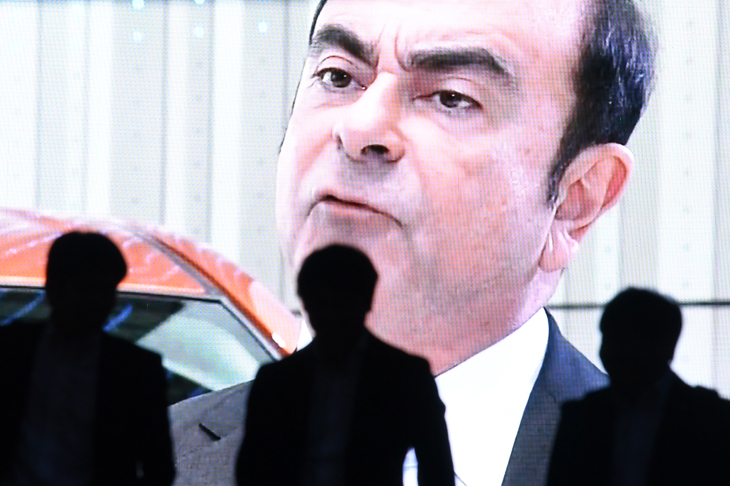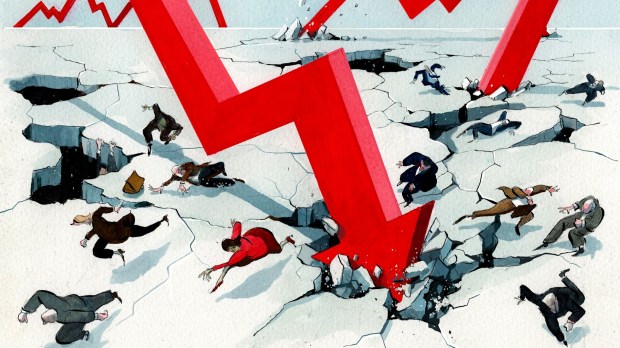The arrest of Carlos Ghosn and the move to oust him as chairman of Nissan in Japan has stunned the auto industry of which he’s a global megastar — serving simultaneously as head of Renault in France, and having bolted together the Renault-Nissan-Mitsubishi alliance that built more than ten million cars last year. Nissan has accused the Lebanese–Brazilian engineer of violating Japanese securities law by understating his remuneration in the company’s public documents, and of ‘numerous other significant acts of misconduct… such as personal use of company assets’. That allegedly includes using Nissan funds to buy properties for his own use in Beirut and Rio de Janeiro.
We must of course wait to hear the evidence. To western ears, an understatement of executive pay in the annual report sounds like an accusation against the company’s auditors as much as the recipients of the bunce. But I’m reminded from my own experience of working in Tokyo of a common expression there: ‘The nail that stands out gets hammered down.’ Things may have changed since my day, but back then (the 1980s, when Japan ruled the industrial world) it was barely imaginable that a cost-slashing foreign executive could start telling the locals how to run their factories.
But that’s precisely what Ghosn did after Renault bought 40 per cent of the ailing Nissan in 1999. And I suspect resentment against him, within an unequal partnership, has been building ever since — not least in relation to a pay package said to have been worth $88 million over the past five years (though only $44 million was declared), which made him Japan’s highest-paid boss.
A vivid parable of Japanese establishment ranks closing against a troublesome gaijin (literally ‘outside person’) is to be found in Exposure, Michael Woodford’s 2012 account of his ordeal as a boardroom whistleblower at the camera-maker Olympus. Woodford was the accuser rather than the accused, but Ghosn’s legal team would still be well advised to study his case.
Pity the poor fishermen
I listen in despair to Brexiteers’ dismissals of pleas from business for a settlement that allows them to plan beyond March next year. On last Friday’s Any Questions?, Jürgen Maier — who runs the £5 billion manufacturing business that is German-owned Siemens UK, and who may be the most respected industrialist in the north of England — spoke persuasively (in the accent of his Leeds schooldays) about the ‘dramatic’ fall-off of business investment and potentially ‘catastrophic’ impact of a no-deal outcome. The response of Tory MP John Redwood was so condescending, essentially ‘well done for coming here and building a business but stop scaremongering’, that I wanted to pour a boiling kettle over the radio.
But the people I really feel sorry for at this juncture are our fishermen, one of the few groups whose livelihoods have unequivocally been damaged by EU membership. Redwood also spoke casually of ‘taking control of our fish’, but I suspect we never will. The FT reports that ‘about eight’ EU countries whose fishermen rely on access to British waters are still demanding post-Brexit quota-sharing guarantees. How easy that will be to trade away for other face-saving concessions as this botched negotiation stumbles to a close.
The end of Facebook?
Are we watching the beginning of the end of Facebook? Founder Mark Zuckerberg and chief operating officer Sheryl Sandberg are under fire for being slow to uncover Russian dirty tricks during the 2016 election, and (though both deny knowledge of it) for the company’s use of a Washington ‘opposition research’ firm called Definers to attack its critics. Zuckerberg is the company’s major shareholder but seems to have a loose grip on its behaviour; Sandberg’s clean image is at odds with the sinister aspects of Facebook’s influence, which reaches two billion users. And many of those users no longer trust Facebook as a benign link to friends and family, but rather see it (to quote Forbes) as ‘a stalking device’.
During my recent US trip, I heard talk of a new ‘antitrust’ campaign to bring today’s tech giants down to size, just as Standard Oil and other over-mighty corporations were broken up a century ago. Robert Reich, who was Bill Clinton’s labour secretary, is the latest to lend weight to that argument. If Facebook is first in the dock, who will speak in its defence?
Who’ll buy Flybe?
I’m sorry to see Flybe encountering another bout of turbulence. This is the short-haul airline of choice for the English middle classes popping over to the Continent: nicer planes and less hustle than Ryanair, at only slightly higher fares. It has survived previous financial storms but now the weaker pound, higher fuel costs and Brexit uncertainty afflicting bookings have brought mounting losses, and Flybe is up for sale to the bravest bidder. That could turn out to be IAG, parent of British Airways and Iberia, which has its eye on the smaller carrier’s landing slots at Heathrow and elsewhere but would probably expunge its name.
Also tipped as potential buyers are easyJet and, more promisingly, Stobart — the infrastructure and energy group that owns Southend airport and joint ventures in aviation with Flybe, but dropped a tentative takeover bid earlier this year. Stobart’s bosses are currently distracted by a court case in which the company and its former chief executive Andrew Tinkler are furiously suing each other. But I see it as a more promising partner, because the Stobart brand is built on its association with the cheerful, well-turned-out trucks and drivers of founder Eddie Stobart’s original road haulage business, familiar to all long-distance motorists. ‘Stobart Flybe’ is an awkward mouthful, but if the travelling public feels warmly towards both names, it would have a flying start.
Got something to add? Join the discussion and comment below.
Get 10 issues for just $10
Subscribe to The Spectator Australia today for the next 10 magazine issues, plus full online access, for just $10.
You might disagree with half of it, but you’ll enjoy reading all of it. Try your first month for free, then just $2 a week for the remainder of your first year.















Comments
Don't miss out
Join the conversation with other Spectator Australia readers. Subscribe to leave a comment.
SUBSCRIBEAlready a subscriber? Log in